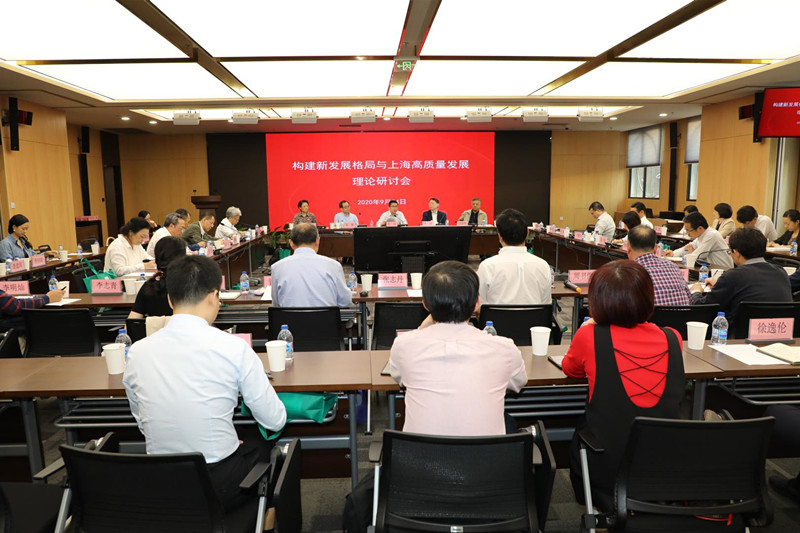Seminar on “New Development Patterns and Shanghai's High-quality Development” held in Shanghai
On September 24, the Seminar on “New Development Patterns and Shanghai’s High-quality Development” jointly hosted by Shanghai Society for Theoretical System of Socialism with Chinese Characteristics and Shanghai Society for Reform, Innovation and Development Strategy Research was held in Shanghai. Xu Jiong, Deputy Director of the Publicity Department of CPC Shanghai Municipal Committee, attended the meeting.

Quan Heng, Secretary of the leading Party Members' Group at Shanghai Federation of Social Science Associations, affirmed at the seminar that the acceleration of the formation of a “dual-circulation” development pattern resulted not only from the profound changes in the international environment and conditions for China’s participation in the international economic circulation, but also the initiative taken by China in strategic adjustment and optimization based on a new stage of development and new problems.
Yuan Zhigang, Director of the Academic Committee of the Faculty of Economics and Management of East China Normal University, pointed out in a speech at the seminar that China should continue to promote the internationalization of the RMB in the future, strengthen its strategic cooperation with the Euro zone, and promote the formation of a new international pattern of “one super-strong and two strong” currencies.
Ning Zhong, a professor from the School of Management of Fudan University, said that we should unblock the domestic industrial chain and supply chain, focus on modernization and technological improvement of the cluster supply chain while enhancing international collaboration to maintain the security and stability of the global cluster supply chain.
Associate Researcher Liu Liang from the Institute of Applied Economics of the Shanghai Academy of Social Sciences proposed that Shanghai should seize new opportunities to develop Shanghai as an important hub of the dual-circulations. This will also be an important new opportunity for Shanghai to become a new “hub”in service of the country’s new initiatives and make a new leapforward.
Chen Xian, a professor from Antai College of Economics and Management of Shanghai Jiaotong University, proposed that Shanghai should speed up organizing and implementing the development planning of the metropolitan area and the special plans for key areas, so as to ensure the implementation of such development plans and special plans.
Lu Pinyue, a professor from Shanghai University of Finance and Economics, said that we should make full use of the advantages of the domestic market to establish a circulation mechanism between the unceasingly growing high-tech R&D centers and the market, and promote the transition to high-quality economic development.
Yu Ji, a professor from China Executive Leadership Academy Pudong, said that the integration of urban and rural development would be an important path to form a new development pattern. The accelerated formation of a new development pattern with the major domestic circulation dominating should require the free flow of urban and rural elements, equal exchange and rational allocation of public resources.
Ding Xiaoqin, a chair professor from Shanghai University of Finance and Economics, proposed that Shanghai should concentrate on the strategic focus of expanding domestic demands and open up all links involving production, distribution, circulation and consumption, making the city the central node of major domestic circulation and taking the lead in transitioning to high-quality development in China.
Guo Shuyong, Dean of the School of International Relations and Public Affairs of Shanghai International Studies University, believed that the outbreak of the COVID-19 pandemic had relatively increased the uncertainty of international relations and differentiation in the international community, having thus obviously increased the cost of diplomacy and the resistance in international circulation, making the prioritizing of domestic circulation the rational choice.

